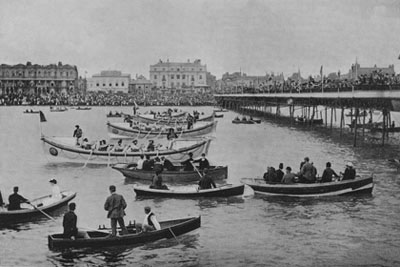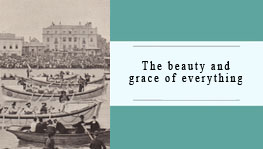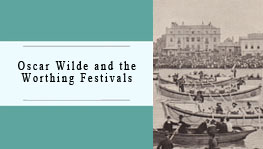
The most important festival held in Worthing in the summer of 1894 was the Lifeboat Demonstration
on 22 August. The Worthing Gazette reported: ‘Among those who viewed it was Mr Oscar Wilde, who is
now on a visit to Worthing, and was one of the occupants of a small rowing boat busily flitting about.’
Chapter 3: 'The beauty and grace of everything' – Oscar Wilde and the Worthing Festivals
This chapter provides background and local colour, focusing on three major open-air public events we know Wilde attended that summer, as well as a concert in the town’s theatre that he attended with his elder son Cyril. The principal performers were the Olympian Quartet, a group of peripatetic outdoor musicians in whom Wilde and Bosie took a particular interest and whom he christened ‘the vagabond singers of the sands’.
Of particular interest is the account of the so-called Venetian Fete, a charming lamp-lit water carnival at the end of which Wilde gave away the prizes for the best-decorated boats, which had been chosen by public vote. The text of Wilde’s speech can be accessed via the Appendices tab on this website.
A couple of pages are devoted to Captain A. B. S. Fraser, one of Worthing’s leading citizens at the time, whom Wilde met that summer. Fraser’s mother was a prolific and popular author of sentimental three-volume novels, a fact that may have inspired Wilde to have Miss Prism be the author of a three-volume novel ‘of more than usually revolting sentimentality’.
The extract below (which, as usual, omits the end-noting) is the opening of Chapter 3, which focuses on Captain Fraser and then on the vagabond singers of the sands.
Oscar Wilde attended several events that took place in Worthing in the summer of 1894. We know this from a comment he made in a speech he delivered on 13 September after the Venetian Fete, at which he gave away the prizes: ‘I have been much struck at the Regatta, at the Lifeboat Demonstration, and other festivals, with the beauty and grace of everything I have seen.’ This remark indicates that Wilde was present not just at three major aquatic events in August and September 1894, but also at other ‘festivals’.
As with any seaside resort of the time, most of the summer entertainments available in Worthing – including musical ones – were out of doors; but we will first address those that were not.
Worthing did not have a dedicated theatre in 1894, but plays and concerts were held at the Assembly Rooms in Bath Place, the entrance to which was almost opposite the front door of 1 Bath Place, where Alphonse Conway’s mother lived with her son and kept her small lodging-house.
The Assembly Rooms had opened ten years before, in 1884. Soon after Wilde’s visit, the auditorium was remodelled – in 1896-7 – and the venue renamed the New Theatre Royal. [1] A red American marble stone was laid in June 1897 by Captain A. B. S. Fraser, by then the Mayor – an individual who, as we shall see, was a recurring supervisory or organisational presence at the Worthing festivals during the summer of 1894.
It is not fanciful to see Captain Alexander Bruce Siddons Fraser – to give him his full name – as a counterpoint to Wilde that summer in Worthing, indeed as the antithesis of Wilde, each man being everything that the other was not. Captain is not a very elevated military rank, equating to Lieutenant in the navy, so perhaps it was to compensate for a modest military career that Captain Fraser strutted his stuff on the small stage that was Worthing in the 1890s. Later he set his sights on a grander target, and from 1907 till 1910 this relentless municipalist was Mayor of Hove. Captain Fraser may have had his reservations about Oscar when they met at the Venetian Fete in September 1894, and any doubts he had would have been amply confirmed by the events of the spring of 1895 – at which point the Captain Frasers of Britain turned against Wilde to a man.
Captain Fraser’s family history is sufficiently interesting to justify a brief digression, not least because it reminds us that potential for scandal can lurk below the surface of the most apparently respectable of families. Alexander Fraser and his younger brother Campbell – also active in Worthing in 1894 – were both born in India, the two legitimate children of General Alexander Fraser and his wife Caroline. General Fraser had a long and distinguished career as a civil engineer, building railways, lighthouses, wharves and docks across India and Burma. By 1867 the marriage had broken down, and Mrs Fraser returned to London with her two sons and began writing novels. The first Not While She Lives, a novel about bigamy, was published in 1870, and a further twenty-two followed over the next quarter of a century, the last, A Mayfair Tragedy, being published in 1894. By 1891 Mrs Fraser and her extended family had arrived in Worthing, where the multi-generational household consisted of Mrs Fraser, her mother, her two middle-aged sons, and her younger son’s wife and their four year old daughter, together with a butler, cook, parlour-maid and nurse,. Seventeen of Mrs Fraser’s twenty-three novels were in three volumes. Their titles – which include Her Plighted Troth, False Hearts and True and Purple and Fine Linen – suggest that, like Miss Prism’s three-volume novel in The Importance of Being Earnest, they may have been ‘of more than usually revolting sentimentality’. Perhaps Captain Fraser discussed his mother’s literary achievements with Worthing’s distinguished visitor when they met at the Venetian Fete.
General Alexander retired in 1886 and returned to England, where he set up house with a young woman nearly forty years younger than himself called Charlotte Smith, who had two illegitimate children by him. The elder, Cecil Fraser became a Lieutenant-Colonel in the army. The younger Bruce Fraser, became Admiral of the Fleet, First Sea Lord and Chief of the Naval Staff – the highest position in the Royal Navy – and was created Baron Fraser of North Cape. Admiral Fraser died unmarried, as did his half-brother Captain A. B. S. Fraser. When Captain Fraser was mayor of Worthing in 1896-8, his younger brother’s wife served as his Lady Mayoress.[2]
It appears from a meeting of the town council reported in the Worthing Gazette on 5 September that Captain Fraser was a combative character. Alderman Cortis, Chairman of the Sanitary Committee – who in 1890-1 had been the first Mayor of Worthing – moved that nine houses in Cook’s Row (see illustrations 39 and 40) be condemned and demolished. There was immediate approval from those present, followed by a spat between Alderman Cortis and Councillor Captain Fraser (the report in the Gazette uses indirect speech, which is here rendered as direct speech):
SEVERAL MEMBERS: Good! Hear, hear!
ALDERMAN CORTIS starts to read extracts from the Act.
COUNCILLOR FRASER (interrupting him): I will second the proposition.
ALDERMAN CORTIS: I know you can be very rude.
COUNCILLOR FRASER: So can you!
THE MAYOR (to Alderman Cortis): Please proceed.
ALDERMAN CORTIS: I think that is rude. I don’t know what you think.
THE MAYOR: I think it is, rather.
ALDERMAN CORTIS: I was simply giving information for the benefit of those who are not so well informed.
COUNCILLOR FRASER: I seconded it so that it might be put to the vote.
ALDERMAN CORTIS: I know Councillor Captain Fraser is ready to vote at any moment.
COUNCILLOR FRASER (warmly): Not for you!
ALDERMAN CORTIS: But you were ready to second it!
Councillor Fraser afterwards declined to second the motion, and Alderman Linfield undertook that duty. The motion was carried.
After that glimpse of Captain A. B. S. Fraser in petulant action, we return to the Assembly Rooms in Bath Place, where Wilde certainly attended one event, for he described the occasion briefly in a letter he wrote Bosie on 8 September.[3] This was the concert given on 7 September by the Olympian Quartet, whom Oscar refers to as ‘the vagabond singers of the sands’. The Worthing Gazette of 12 September gives this short account:
The four vocalists who have given performances on the sea-front during the season, and who style themselves the Olympian Quartet, had a farewell benefit concert at the Assembly Rooms on Friday evening. They had secured the patronage of the Mayor (Alderman R. Piper), Lord William [sic] Douglas, and Mr Oscar Wilde, and a large audience was present. Various performers assisted them, an ample and interesting programme being presented.
Bosie had left Worthing by then, so Oscar took Cyril to the concert. In his letter Oscar told Bosie that there was applause as they entered and that the audience thought Cyril was Bosie.
There is something rather mysterious about the vagabond singers of the sands. Their activities had recently been discussed by the General Purposes Committee of the town council – indeed earlier in the same meeting at which Captain Fraser and Alderman Cortis sparred. The 5 September edition of the Gazette carried a report, under the headline ‘Singers on the Sea-Front’. There is a lack of clarity as to dates, but the issue seems first to have been discussed on 13 August, with the further discussion taking place after the minutes were read at a subsequent meeting.
A certain Mr J. E. Nash had written to the council to complain about the singers:
My brother has been sent by his medical attendant to the sea-side, and is now lying seriously ill at 38, Marine Parade [this house was in the centre of Cambridge Terrace, just west of the pier – see illustration 51], and he complains most painfully of the abominable nuisance occasioned from morning to night by the itinerant street singers on the sea-front opposite his residence.
The minutes recorded that the committee had passed the following resolutions: first, ‘that the Town Clerk inform Mr Nash that steps will be taken to remove the singers to other parts of the beach’; and, second, ‘that the inspector be instructed not to permit any singing on the beach or Parade, between the east side of the pier and the band stand’.
After the minutes were read, there were some exchanges about these ‘itinerant street singers’ (the Gazette’s report uses indirect speech, again rendered here as direct speech):
ALDERMAN GREEN (laughingly): I suggest the substitution of the word ‘country’ for ‘beach’ in the first resolution, which would thus read: ‘That the Town Clerk inform Mr Nash that steps will be taken to remove the singers to other parts of the country.’ (Laughter.)
COUNCILLOR HINE: I am sorry to hear Alderman Green speak like that, as the singers are the only attraction the beach has had. People enjoy their performances a great deal more than they do those of the Socialists on Sundays, Salvationists, and so on.
ALDERMAN CORTIS: It was only a bit of pleasantry on Alderman Green’s part. We must cater for all sorts. (Hear, hear.)
COUNCILLOR FRASER: I agree with you for once. (Laughter.)
ALDERMAN LINFIELD: The singers have been found to be very ready to move in a case of illness. It would be very unwise to try to prevent them singing there, as a lot of people are glad to stand and listen to them, and all classes must be catered for. Councillor Haywood has suggested that the singers should use the Band Stand, but it might be better to have the Cabmen’s Shelter there for them. (Laughter.)
This discussion increases rather than diminishes the mystery of the vagabond singers of the sands, who call to mind the decadent-looking group of singers and instrumentalists that serenaded Von Aschenbach and Tadzio on the hotel terrace in Visconti’s film of Death in Venice. However, in view of the fact that Wilde and Bosie took so much interest in the Olympian Quartet that they sponsored their concert, perhaps the Worthing singers were young and, as their name implied, ‘Hellenic’ – to use the word Wilde chose for Percy, the handsome boy Bosie favoured that summer.[4] Or perhaps the vagabond singers appealed to Oscar and Bosie simply because they were free spirits. Either way, it is surprising that the Mayor should have wanted to co-sponsor a concert featuring this unusual and controversial group of al fresco singers.[5]
1. Robert Elleray, Sussex Theatres: An Illustrated Survey and Gazetteer, c. 1750-2000 (2000), p. 38. The New Theatre Royal closed on 9 February 1929 – Elleray, Worthing Theatres, 1780-1984 (1985), p. 14 – and was demolished in 1934. The interior of the building underwent extensive restructuring in 1897 and 1906, but Elleray believes that the outside remained much as it had been when it was the Assembly Rooms, although the glass canopy to protect queuing patrons from the rain seen in illustration 27 was probably an addition dating from 1897 or 1906 (telephone conversation, 13 October 2011). Oddly, an advertisement for a play called Theodora in the Worthing Gazette of 5 September 1894 uses the name ‘Theatre Royal, Worthing’ for the venue, so that name was evidently already sometimes in use in Wilde’s time.
2. Information from www.clanfraser.ca/admiral_fraser.htm and www.victorianresearch.org/atcl/show_author.php?aid=459. The birth and death dates of the members of the Fraser family are as follows: General Alexander Fraser (1824-1898), Caroline Fraser, née Small (1829-1908), Captain Alexander Fraser (1847-1933), Captain Campbell Fraser (1850-1926), Charlotte Smith (1861-1946), Lieutenant-Colonel Cecil Fraser (1885-1951), Admiral Bruce Fraser (1888-1981). Captain A. B. S. Fraser was a farmer, first at West Tarring Farm, just north-west of Worthing – where he won prizes for his cows Betsy in 1897 (Country Life, 1897) and Perry Farm Pansy in 1902 (Journal of the Royal Agricultural Society of England, 1902) – and then at Withdean Farm near Brighton. When he died in 1933, The Sussex County Magazine reported: ‘Sussex has lost one of its most prominent public men.’
3. Merlin Holland and Rupert Hart-Davis, eds, The Complete Letters of Oscar Wilde (Fourth Estate, 2000), pp. 607-8.
4. 4. See Chapter 4.
5. By an odd coincidence there was a group of singers called the Olympian Quartet active in America at the same time. The New York Sun reported on 2 May 1894: ‘There are few brand-new things in the variety theatres this week. La Belle Tina made her American debut at the Union Square on Monday, and displayed a deal of grace in posing and balancing in midair. Here, too, are Wood and Sheppard and the Olympian Quartet, which was for a long time associated with Evans and Hoey [a well-known vaudeville act of the period]. The list of performers is long.’ Performances by this Olympian Quartet are also noted in the New York Times of 16 July 1901 (they had performed ‘a long list of new and old favourites’ at Keith’s Union Square Theatre) and the Monroe County Mail of 27 February 1902, which reports that the Olympian Quartet of Rochester ‘gave an entertainment in Grange Hall Saturday evening’. Worthing would have been an unlikely destination for vaudevillians from New York, so it is improbable – though not impossible – that the American quartet were the singers that performed in the town in the summer of 1894.

